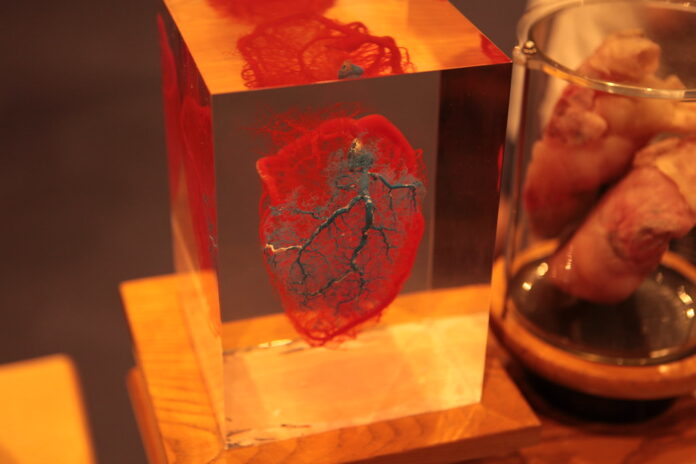[ad_1]
Satjit Bhusri, MD, is worried about heart health, his own, and yours. A long-time New York City cardiologist, he is now treating the aftereffects of Covid-19. “What’s unusual about COVID…is that it is extremely inflammatory. That means the body attacks [the virus], and [the immune system] kind of goes overboard,” he said.
What is unnerving is that the cardiovascular damage often appears after the virus has been shed.
If the Covid-19 heart connection seems surprising, it was news to doctors too, because Covid is considered a respiratory disease. But Covid patients began showing vascular problems.
“Patients were showing blood clots forming in their legs,” he said, And the detective work began. “What’s going on with the vascular system?”
It is the effects of the virus that get at the heart. “It interacts and interferes with the inner lining of your blood vessels,” said Dr. Bhusri. This can lead to serious side effects. The inflammation inside the blood vessels can lead to blood clots, and these in turn can lead to heart attacks and strokes. “It also looks like it directly infiltrates the muscle of the heart and it can cause heart failure, as well as arrhythmias or dangerous heart rhythms.”
Dangerous heart rhythms sound pretty scary. So, should people be worried? In this Covid-19 world where the CDC estimates that 83.1 million people have had Covid, many of those people without any symptoms, should we all be worried about our hearts, both those who’ve had Covid and those who haven’t?
Doctors are still investigating the full extent of Covid-19. “This is not just a simple virus, this is an animal that I strongly feel will have its own subspecialties,” said Dr. Bhusri, explaining that scientists and doctors are still studying viruses like ebola, HIV, and even the Spanish flu. He thinks research into Covid-19 is here to stay as doctors and researchers try to understand this new viral player. “The organs that we’re seeing affected and the long-term effects, we’re just starting to understand,” he explained
Others share his opinion.
David Baran, MD, the director of Advanced Heart Failure and Transplantation at Sentara Health System in Virginia spoke at a cardiovascular conference in 2020. “We are literally learning as we go along,” he said, “One of the problems is that COVID is a shapeshifter. Just when you think you understand what you are dealing with it changes.” His remarks were reported in Diagnostic and Interventional Cardiology.
But, back to the question at hand, should you worry about heart health? The short answer is maybe. Steven Erickson, MD, medical director for Banner University Sports Medicine in Phoenix, AZ, cautioned that people who have had Covid shouldn’t return to old levels of activity “You don’t get sick with COVID-19 and stay home from school for a week and the next day go back and play two hours of soccer,” he said in comments to the Arizona Republic.
According to a report from The Perelman School of Medicine at the University of Pennsylvania, doctors now routinely check heart health when Covid-19 is suspected. There is no magic way to know who might have heart complications from Covid-19. Some people recover with no ill effects and others don’t. In August 2020 The Lancet discussed a case study of an 11-year-old who developed heart failure. According to the American Heart Association, about a quarter of people hospitalized show cardiovascular conditions, and they are thought to contribute to 40% of Covid-19 related deaths.
Checking out the house
Inside the clinic, Dr. Bhsuri has seen patients who had asymptomatic Covid, with no symptoms related to the initial virus, who went on to develop heart conditions. For those patients, the best thing is preventive testing. Dr. Bhsuri likes to think of the heart as a house, with a structure (the heart muscle), electricity, and plumbing. All of these parts can contribute to different conditions like a heart rate that is irregular, too slow or too fast, or heart disease. Dr. Bhsuri described a few cases where he’s found Covid-19 patients with new-onset heart failure, heart disease, or arrhythmias. “For thoroughness, for patients who were COVID positive no matter where they were in the spectrum of the disease, they should definitely get screened for cardiovascular disease,” suggested Dr. Bhsuri.
Dr. Bhusri has a personal connection to his work. In 2015 he experienced cardiac shock and was hospitalized in an ICU. During the pandemic, he ran a Covid-19 unit, quarantining away from his family. To him, this was one of the hardest things in his life, second only to his heart condition. People like Dr. Bhusri, because of the impact that Covid-19 can have on the heart and cardiovascular system, are at high risk.
An ounce of prevention …
As for people who don’t have any pre-existing risks, Dr. Bhusri’s advice focuses on lifestyle to protect good heart health. He emphasized a good diet, preferably the Mediterranean diet, and exercise. “Wherever you are…you have got to keep moving.”
Avoiding heart issues, and receiving regular monitoring of your heart’s health, are the best ways to keep it healthy. And during this pandemic, following established habits — always staying masked in public, avoiding close contact, and so on — can only help that goal.
Sabrina Emms is a science journalist. She got her start as an intern at a health and science podcast out of Philadelphia public radio. Before that she worked as a researcher, looking at the way bones are formed. When out of the lab and away from her computer, she’s moonlighted as a pig vet’s assistant and a bagel baker.
Medically reviewed by Yvonne Stolworthy, MSN, RN
[ad_2]
Source link












